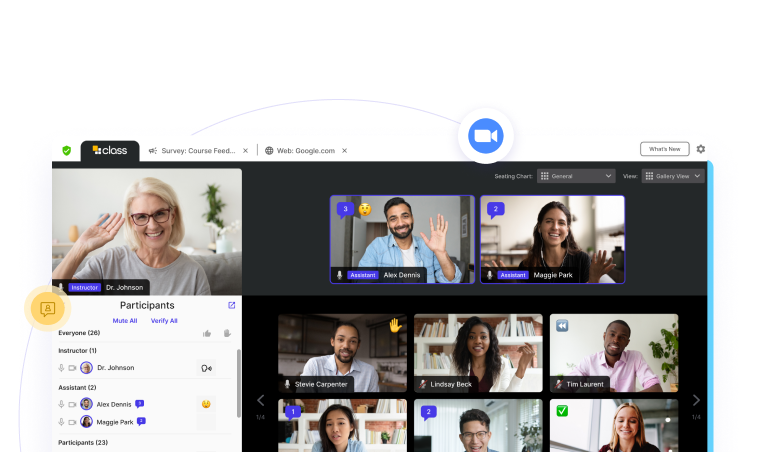
Mike Lovell is the SVP of Marketing at Class. He has dedicated his career to technology and the applications that can innovate the way people live and learn.

Mike Lovell is the SVP of Marketing at Class. He has dedicated his career to technology and the applications that can innovate the way people live and learn.

Just as quality online classroom programs lay the foundation for students and faculty to have the proper environment to operate, Pillar II, the student experience, is grounded by ensuring a student-centered approach permeates the virtual classroom journey. It’s important to note that the student experience doesn’t just exist inside the digital classroom. In order to truly nurture learners throughout their academic path, it’s vital to intentionally craft the learner experience in the classroom, provide student engagement through social community, and offer services that address the well-being of the whole individual.
Matching the right teaching style with the appropriate modality is a crucial part of translating traditional classroom-setting coursework to online classrooms. Importantly, not all teaching styles convert as effectively. Lecture-style coursework—when not thoughtful with delivery—can often leave students feeling disengaged online, placing them in a state of passive learning.
A 2020 survey on active learning out of Deakin University found that students reported increased satisfaction with workload, teacher quality, and learning experiences versus passive teaching styles—with increases ranging from 25 to 41 percentage points.
Where applicable, institutions should aim to replicate effective in-classroom strategies to foster deeper levels of student engagement, including:
Some institutions have taken it a step further, looking outside the typical bounds of education to heighten online student engagement. Dr. Rozalind Jester, Assistant Vice President of Strategic Innovation and Online Learning for Florida Southwestern State College, and her team created a course called “Level Up.”
What makes this course different than other programmatic offerings is the use of gamification in order to educate learners on how to make the best use of technical features within their online courses. This unique strategy merges highly engaging interaction with necessary and trainable skills to empower learners not just in “Level Up,” but in all of their virtual classroom coursework at Florida Southwestern State College.
Making use of resources that are centered around regular and substantive interaction (RSI) can also allow faculty to gauge the effectiveness of their course’s proposed student engagement efforts. In addition, consistently inviting student feedback can aid institutions in their efforts to understand—and meet—learner needs.
Among the supporters of the “college experience” are the traditions, memories, friendships, and culture which are established through the campus community. Online classroom programming has lagged in providing this vital function for its student population. The next iteration of highly engaging, holistically crafted online coursework is to build meaningful digital campus communities. By providing community as part of the online classroom experience, institutions can tap into the myriad of benefits already present through on-campus education.
In a recent webinar, Dr. Joshua Kim, Director of Online Programs and Strategy for Dartmouth College, pointed to utilizing smaller, more intimate courses where possible. Dr. Kim also encourages a mix of asynchronous and synchronous learning, as well as providing occasional opportunities to bring students together in person when available. This approach has had success for the graduate programs at Dartmouth College which predominately feature working, non-local adults.
This resonates strongly with Dr. Jester, who reiterates, “I can’t emphasize enough how much I believe in the importance of humanizing the space for online learning.” By exploring unique ways to either reproduce successful community-building activities for online populations or cultivating opportunities to bring those students into real-time, in-person experiences, not only does student satisfaction increase, but persistency toward degree completion—and long-term institutional loyalty—are also potential by-products.
Dr. Patrice Torcivia Prusko, Director of Learning Design, Technology, and Media for Harvard University Graduate School of Education, notes, “I think social capital is often overlooked. It’s so critical to social mobility.” Dr. Prusko acknowledges that many professionals make upward progress due to networking, and this element of virtual classroom programming has not been as heavily emphasized, creating an opportunity to close this gap and yield online learners’ professional rewards.
While it can be easy to view online learners through a myopic lens due to the often-truncated nature of interaction digitally, the reality is that students utilizing online classroom programming are still full, holistic individuals with a variety of needs that exist outside their virtual classroom experience.
Institutions positioned to serve online learners in the extended ways they need assistance will reap the benefits of increased student engagement, as well as higher course and degree completion—which translates to rising enrollment and retention rates.
Providing helpful focuses on technical support, financial education, counseling resources, and more allow learners to address the issues they’re facing effectively and continue to devote their attention and effort to their coursework.
Dr. Jester echoes this sentiment, adding, “You need the community and the support—the wraparound services to help students get through.” Students also need faculty, the focus of Pillar III.
Evidence shows that online learners are just as demanding of full, holistic student experiences—including networking opportunities, socialization, and wraparound resources—as traditional students.
Ready to engage your online learners in more robust ways than ever before—and enjoy the bump in enrollment and retention that accompanies a more intentional student experience? Talk with our team today, and let’s transform your institution’s online student experience!

Mike Lovell is the SVP of Marketing at Class. He has dedicated his career to technology and the applications that can innovate the way people live and learn.

Mike Lovell is the SVP of Marketing at Class. He has dedicated his career to technology and the applications that can innovate the way people live and learn.
Get our insights, tips, and best practices delivered to your inbox

Sign up for a product demo today to learn how Class’s virtual classroom powers digital transformation at your organization.

Features
Products
Integrations